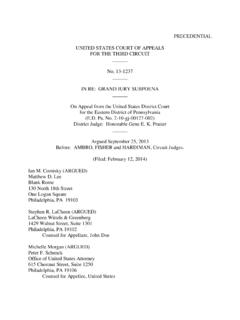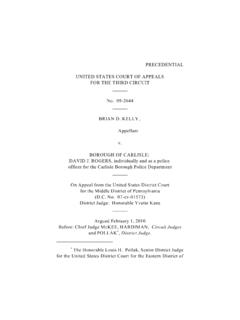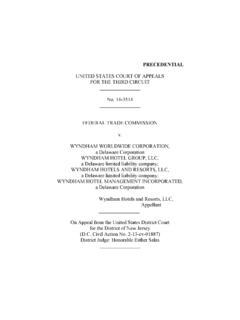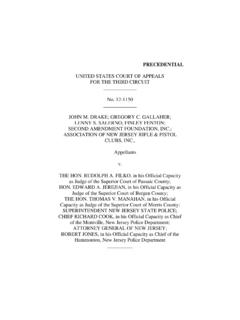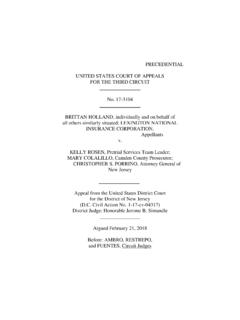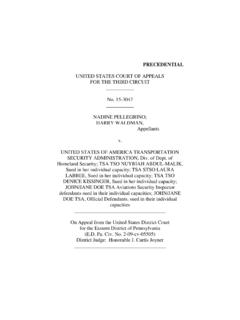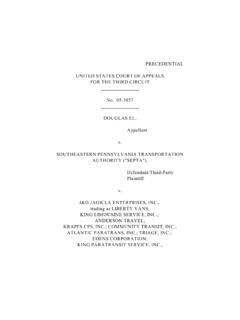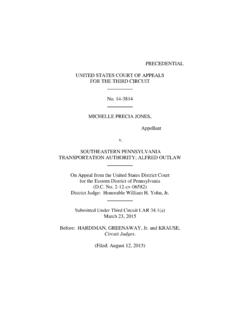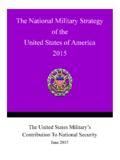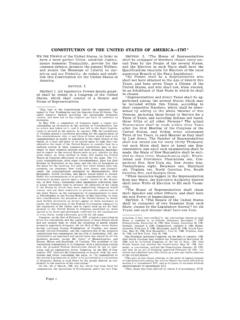Transcription of UNITED STATES OF AMERICA, Respondent
1 PRECEDENTIAL UNITED STATES COURT OF APPEALS FOR THE THIRD CIRCUIT _____ No. 16-1979 _____ PATRICIA YUISEL FLORES, Petitioner v. ATTORNEY GENERAL UNITED STATES OF america , Respondent _____ On Petition for Review of a Decision of the Board of Immigration Appeals Immigration Judge: Honorable Leo A. Finston (A089-827-629) _____ Argued: November 17, 2016 Before: AMBRO, SHWARTZ, and FUENTES, Circuit Judges (Opinion Filed: May 8, 2017) 2 Marcia Kasdan [ARGUED] Marcia S. Kasdan & Associates 127 Main Street, 1st Floor Hackensack, NJ 07601 Attorney for Petitioner Jefferson B.
2 Sessions III UNITED STATES Attorney General Benjamin C. Mizer Principal Deputy Assistant Attorney General Douglas E. Ginsburg Assistant Director Thomas W. Hussey Andrew B. Insenga [ARGUED] Karen L. Melnick UNITED STATES Department of Justice Office of Immigration Litigation Box 878, Ben Franklin Station Washington, 20044 Attorneys for Respondent _____ OPINION OF THE COURT _____ FUENTES, Circuit Judge. Patricia Flores, a native and citizen of Guatemala, seeks review of a decision by the Board of Immigration Appeals ( BIA ) that found her ineligible for withholding of 3 removal because she had been convicted of a particularly serious crime namely, she was convicted of accessory after the fact in South Carolina for witnessing, but failing to report, a murder.
3 Flores now petitions for review, contending that her South Carolina conviction does not constitute a particularly serious crime under our decision in Denis v. Attorney General, and that she should therefore be eligible for withholding of removal. We agree. Because Flores s South Carolina accessory-after-the-fact conviction is not an offense relating to obstruction of justice, it cannot be considered either an aggravated felony or a particularly serious crime under the Immigration and Nationality Act ( INA ). Accordingly, Flores is eligible for withholding of removal. I. Flores, a Guatemalan native, originally entered the UNITED STATES with her husband to escape her abusive father.
4 Although her husband traveled with a visa, she entered the country illegally. The two had a daughter together, but subsequently divorced, and Flores entered various relationships with other men and women. According to the record on appeal, Flores traveled to South Carolina to visit family in late 2007. While there, she struck up a relationship with a young man, Fredy Sibrian. Unfortunately, this relationship soon deteriorated as Sibrian became increasingly violent, jealous and possessive, causing Flores to leave She then traveled to North Carolina, where she met, and started dating, another man, Antonio Perez.
5 When Flores subsequently returned to South Carolina with Perez in April 2008, Sibrian confronted them at a gas station, causing a heated exchange that ended when 1 App. at 316. 4 Sibrian shot and killed Perez. According to Flores, she did not immediately report the murder because Sibrian threatened to kill her and her then-three-year-old daughter if she disclosed Sibrian s actions to the police. Fearing Sibrian s retribution, Flores returned to North Carolina, but she was later arrested and sent back to South Carolina, where she was charged with Perez s murder.
6 Flores eventually pleaded guilty to accessory after the fact under South Carolina law2 and was sentenced to five years imprisonment. According to Flores s testimony, which the Immigration Judge ( IJ ) found credible, she pleaded guilty to accessory after the fact because she failed to report the murder to police. The record does not reflect that Flores covered up the homicide, lied to police or prosecutors, or assisted the shooter in any way. After serving about two years of her prison term, Flores was removed to Guatemala. A few months later, however, she re-entered the UNITED STATES illegally.
7 In 2015, following her arrest for prostitution, Flores was detained by Immigration and Customs Enforcement. During an asylum interview, she stated that she feared returning to Guatemala because: (1) her father, who had physically and sexually abused her as a child, wanted to kill her; (2) she had been raped by members of a local gang immediately following her previous removal to Guatemala; and (3) she feared that she would be persecuted because she is a lesbian. The asylum officer determined that Flores had a reasonable fear of persecution. The case was referred to the Immigration Court where Flores filed an application for withholding of removal 2 Code Ann.
8 16-1-55. 5 and relief under the Convention Against Torture ( CAT ). The IJ made two primary findings with respect to Flores. First, the IJ found that Flores s conviction for accessory after the fact was a particularly serious crime under the INA, rendering her ineligible for withholding of removal. Second, the IJ found that Flores failed to adequately establish that she would, more likely than not, be subjected to torture in Guatemala, as required to obtain relief under CAT. Flores then appealed to the BIA. The BIA dismissed the appeal and affirmed the IJ s decision on both grounds.
9 First, relying on its own decisions and our holding in Denis,3 the BIA concluded that Flores s accessory-after-the-fact conviction relat[es] to obstruction of justice, and therefore constitutes a particularly serious crime. 4 The BIA also concluded that Flores had not meaningfully challenged the denial of her CAT claim because she failed to produce any purported new evidence in support of her position. Flores now petitions for review of two BIA determinations: (1) that her accessory-after-the-fact conviction is a particularly serious crime rendering her 3 633 201, 212-13 (3d Cir.)
10 2011) (holding that a New York conviction for evidence tampering was relat[ed] to obstruction of justice within the meaning of the INA). 4 App. 30. 5 The BIA exercised appellate jurisdiction under 8 (b)(3), and we exercise jurisdiction over Flores s petition for review pursuant to 8 1252(a)(1). 6 ineligible for withholding of removal,6 and (2) that she did not meaningfully challenge the denial of her CAT We address each in turn. A. The INA provides that the Attorney General may not remove an alien to a country if the Attorney General decides that the alien s life or freedom would be threatened in that country.
